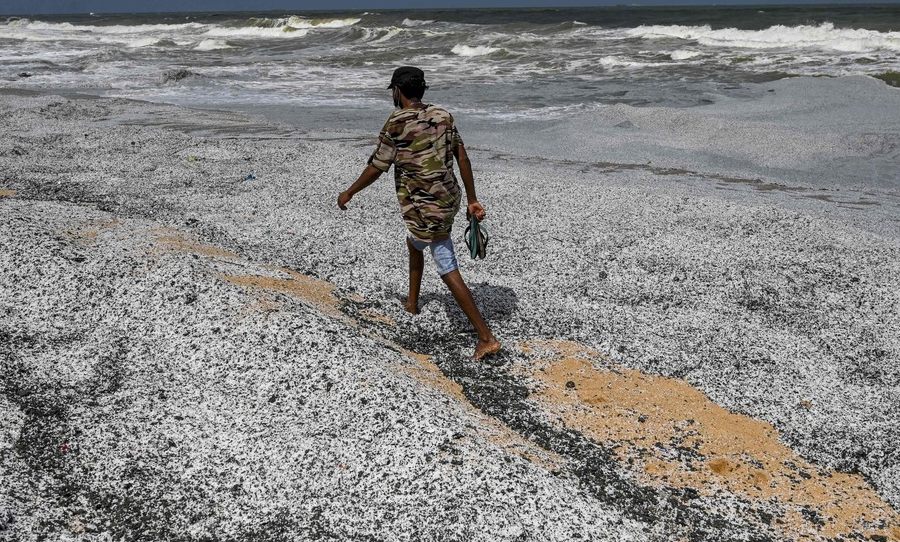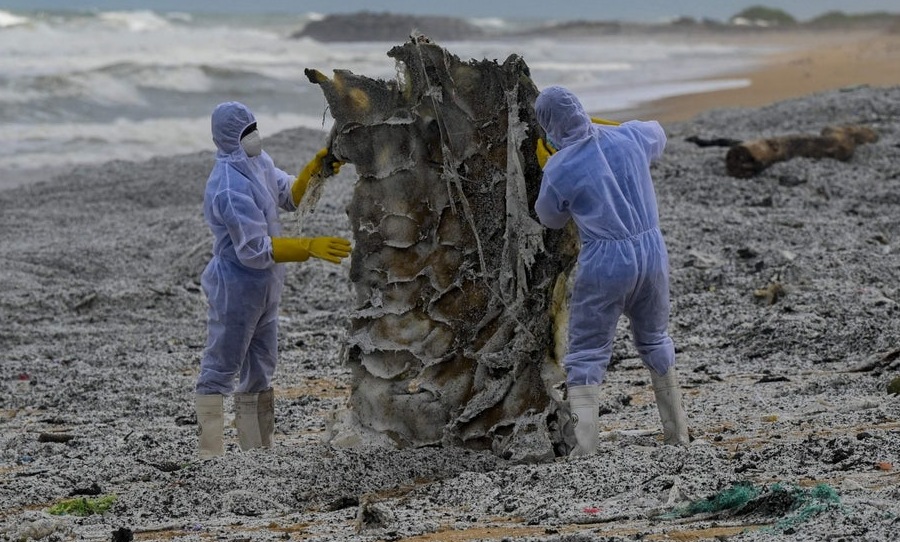Sri Lanka is at risk of suffering the ‘worst beach pollution’ in history after a damaged container ship spills plastic into the ocean.
We’ve seen time and time again how toxic damaged ships and manmade materials can be for the environment.
Recently, The Marine Protection Authority (MEPA) of Sri Lanka has gone on record to say that microplastic pollution (specifically plastic pellets) coming from a burning Singaporean container ship “could cause years of ecological damage” to the region.

MEPA’s chairman, Dharshani Lahandapura, had this to say regarding the matter: “This is probably the worst beach pollution in our history.”
The burning ship, “Singapore-registered MV X-Press Pearl”, has been burning off the country’s capital city, Colombo, for the past ten days.
The ship was due to enter the city’s port to complete its journey from Gujarat, India.
Before catching fire, the ship carried a large volume of hazardous chemicals “including 25 tonnes of nitric acid, sodium hydroxide, lubricants and other chemicals”.
The fire is believed to have been caused by a nitric acid leak that the crew was only made aware of the day after the fire sparked.
A close up video of devastated MV X Press Pearl vessel off the coast of Sri Lanka. Fear is regarding the environmental damage it may cause. India is sending Samudra Prahari, a specialized pollution response vessel, to augment pollution control efforts. https://t.co/MSS4QTK0CM pic.twitter.com/XpptZD8b5A
— Sidhant Sibal (@sidhant) May 29, 2021
Sri Lanka’s navy chief, Vice Admiral, Nishantha Ulugetenne, has reassured civilians and the media that the fire has been contained with no risk of the ship “breaking up”.
“Right now, there is no threat of the ship breaking up, but we don’t know how much of oil is still left,” said Ulugetenne.
While it has been reported that all crew members have been safely evacuated, the sheer volume of plastics washing up on Sri Lanka’s west coast has been a cause for concern.
Approximately “37 kilometres” worth of plastic pellets (spanning from the tourist site, Negombo, in the north to the holiday destination, Kalutara, in the south) have washed ashore, with cleaning crews having to use mechanical diggers for the job.
Reports say that some areas where the pollutants reach “60 centimetres deep” into the sand. Unsurprisingly, the continuous amount of plastic polluting the area continues to cause stress for authorities and cleaners.
“This is like the coronavirus. No end in sight. We removed all the plastic yesterday, only to see more of it dumped by the waves overnight,” said navy sailor and beach cleaner, Manjula Dulanjala.
Sri Lanka braces for beach pollution as ship burns. #AFP
📸 @lakruwan7https://t.co/LyVqeU4piY pic.twitter.com/Npe2RxLhIb— AFP Photo (@AFPphoto) May 27, 2021
Plastic pellets are notorious for the damage they can cause to environments. They’re small enough to be eaten by fish and become stuck in the animal’s body.
Currently, experts are examining the potential effects the disaster could have on Sri Lanka’s mangroves and marine environments. This has caused the government to implement a coastal fishing ban spanning 80 kilometres within the vicinity of the container ship.
At the same time, precautionary nets have been set up in Negombo to protect the area’s crabs and prawns in the chance of an oil leak.



